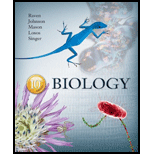
Concept explainers
a.
To determine:
The amount of copper between
Introduction:
The nutrients are the atoms, molecules, elements or the compounds required by the living organisms for their growth and development. The plants obtain nutrients from the soil or synthesize through photosynthesis. On the basis of requirements, the nutrients are of two types, namely micronutrients and macronutrients. The micronutrients are usually required in parts per million, whereas the macronutrients are required in somewhat larger amounts.
a.
Explanation of Solution
The copper is the micronutrient which is required in ppm for the growth of the plant. The conversion of
The amount of copper consumed by eating
b.
To determine:
The amount of zinc between
Introduction:
The nutrients are the atoms, molecules, elements or the compounds required by the living organisms for their growth and development. The plants obtain nutrients from the soil or synthesize through photosynthesis. On the basis of requirements, the nutrients are of two types, namely micronutrients and macronutrients. The micronutrients are usually required in parts per million, whereas the macronutrients are required in somewhat larger amounts.
b.
Explanation of Solution
The zinc is the micronutrient which is required in ppm for the growth of the plant. The conversion of
The amount of zinc consumed by eating
c.
To determine:
The amount of potassium between
Introduction:
The nutrients are the atoms, molecules, elements or the compounds required by the living organisms for their growth and development. The plants obtain nutrients from the soil or synthesize through photosynthesis. On the basis of requirements, the nutrients are of two types, namely micronutrients and macronutrients. The micronutrients are usually required in parts per million, whereas the macronutrients are required in somewhat larger amounts.
c.
Explanation of Solution
The potassium is the micronutrient which is required in larger amounts for the growth of the plant. The conversion of
d.
To determine:
The amount of iron between
Introduction:
The nutrients are the atoms, molecules, elements or the compounds required by the living organisms for their growth and development. The plants obtain nutrients from the soil or synthesize through photosynthesis. On the basis of requirements, the nutrients are of two types, namely micronutrients and macronutrients. The micronutrients are usually required in parts per million, whereas the macronutrients are required in somewhat larger amounts.
d.
Explanation of Solution
The iron is the micronutrient which is required in ppm for the growth of the plant. The conversion of
The amount of iron consumed by eating
The micronutrients are required in fewer amounts and the concentration is usually measured in ppm, whereas the macronutrients are required in larger amount and measured in percentage.
Want to see more full solutions like this?
Chapter 38 Solutions
Biology with Connect Access Card
- When setting up a PCR reaction to act as a negative control for the surface protein A gene... Which primers will you add to the reaction mix? mecA primers, spa primers, mecA primers and spa primers, no primers What will you add in place of template? sterile water, MRSA DNA, Patient DNA, S. aureus DNAarrow_forwardDraft a science fair project for a 11 year old based on the human body, specifically the liverarrow_forwardYou generate a transgenic mouse line with a lox-stop-lox sequence upstream of a dominant-negative Notch fused to GFP. Upon crossing this mouse with another mouse line expressing ectoderm-specific Cre, what would you expect for the phenotype of neuronal differentiation in the resulting embryos?arrow_forward
- Hair follicle formation is thought to result from a reaction-diffusion mechanism with Wnt and its antagonist Dkk1. How is Dkk1 regulated by Wnt? Describe specific cis-regulatory elements and the net effect on Dkk1 expression.arrow_forwardLimetown S1E4 Transcript: E n 2025SP-BIO-111-PSNT1: Natu X Natural Selection in insects X + newconnect.mheducation.com/student/todo CA NATURAL SELECTION NATURAL SELECTION IN INSECTS (HARDY-WEINBERG LAW) INTRODUCTION LABORATORY SIMULATION A Lab Data Is this the correct allele frequency? Is this the correct genotype frequency? Is this the correct phenotype frequency? Total 1000 Phenotype Frequency Typica Carbonaria Allele Frequency 9 P 635 823 968 1118 1435 Color Initial Frequency Light 0.25 Dark 0.75 Frequency Gs 0.02 Allele Initial Allele Frequency Gs Allele Frequency d 0.50 0 D 0.50 0 Genotype Frequency Moths Genotype Color Moths Released Initial Frequency Frequency G5 Number of Moths Gs NC - Xarrow_forwardWhich of the following is not a sequence-specific DNA binding protein? 1. the catabolite-activated protein 2. the trp repressor protein 3. the flowering locus C protein 4. the flowering locus D protein 5. GAL4 6. all of the above are sequence-specific DNA binding proteinsarrow_forward
- Which of the following is not a DNA binding protein? 1. the lac repressor protein 2. the catabolite activated protein 3. the trp repressor protein 4. the flowering locus C protein 5. the flowering locus D protein 6. GAL4 7. all of the above are DNA binding proteinsarrow_forwardWhat symbolic and cultural behaviors are evident in the archaeological record and associated with Neandertals and anatomically modern humans in Europe beginning around 35,000 yBP (during the Upper Paleolithic)?arrow_forwardDescribe three cranial and postcranial features of Neanderthals skeletons that are likely adaptation to the cold climates of Upper Pleistocene Europe and explain how they are adaptations to a cold climate.arrow_forward
- Biology Questionarrow_forward✓ Details Draw a protein that is embedded in a membrane (a transmembrane protein), label the lipid bilayer and the protein. Identify the areas of the lipid bilayer that are hydrophobic and hydrophilic. Draw a membrane with two transporters: a proton pump transporter that uses ATP to generate a proton gradient, and a second transporter that moves glucose by secondary active transport (cartoon-like is ok). It will be important to show protons moving in the correct direction, and that the transporter that is powered by secondary active transport is logically related to the proton pump.arrow_forwarddrawing chemical structure of ATP. please draw in and label whats asked. Thank you.arrow_forward
- Nutritional Sciences: From Fundamentals to Food, ...Health & NutritionISBN:9781337486415Author:McGuirePublisher:CengageBasic Clinical Lab Competencies for Respiratory C...NursingISBN:9781285244662Author:WhitePublisher:Cengage





